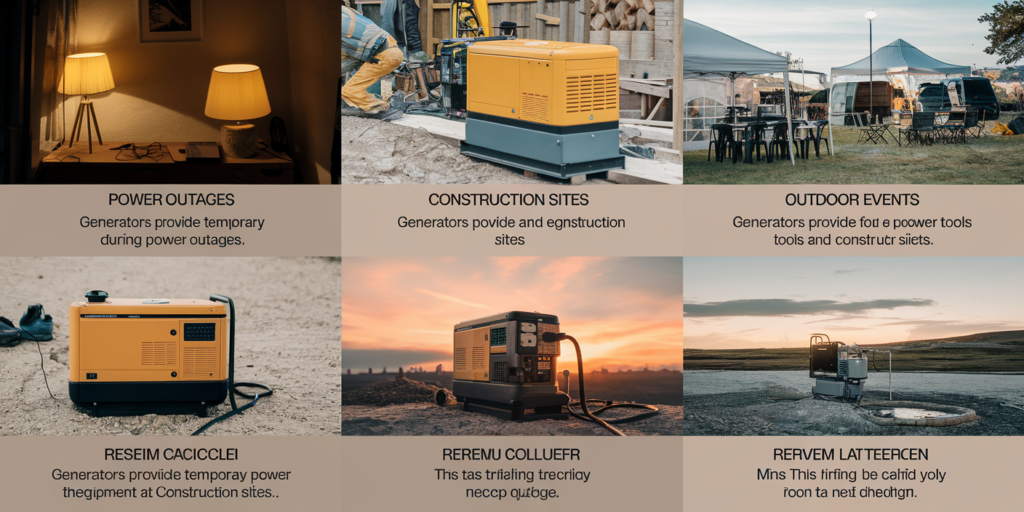Generators provide reliable power in situations where electricity is unavailable, unstable, or insufficient. Below are the most frequent use cases for generators across different sectors:
1. Emergency Power Backup (Home & Business)
- Scenario: Power outages caused by storms, grid failures, or natural disasters.
- Generator Types: Standby generators, portable generators, inverter generators.
- Usage:
- Keeps lights, refrigerators, and medical equipment running.
- Ensures business continuity for offices, data centers, and retail stores.
2. Outdoor & Recreational Activities
- Scenario: Camping, RV trips, tailgating, and outdoor events.
- Generator Types: Portable generators, solar generators, silent generators.
- Usage:
- Powers small appliances (e.g., electric grills, coolers, LED lights).
- Charges phones, laptops, and cameras.
3. Construction & Job Sites
- Scenario: Remote construction sites with no grid access.
- Generator Types: Diesel generators, gas generators, heavy-duty portable generators.
- Usage:
- Runs power tools (drills, saws, welders).
- Provides lighting and temporary electricity for workers.
4. Agriculture & Farming
- Scenario: Farms, irrigation systems, and livestock operations.
- Generator Types: Diesel generators, biogas generators, hybrid generators.
- Usage:
- Powers water pumps, milking machines, and electric fences.
- Supports grain drying and cold storage for produce.
5. Healthcare & Hospitals
- Scenario: Hospitals, clinics, and emergency medical services.
- Generator Types: Standby generators, inverter generators (for sensitive equipment).
- Usage:
- Ensures life-support machines (ventilators, dialysis) stay operational.
- Prevents data loss in medical labs and pharmacies.
6. Events & Entertainment
- Scenario: Concerts, weddings, food trucks, and film shoots.
- Generator Types: Silent generators, inverter generators, solar generators.
- Usage:
- Supplies electricity for sound systems, lighting, and food stalls.
- Reduces noise pollution in public events.
7. Industrial & Manufacturing
- Scenario: Factories, mining operations, and oil rigs.
- Generator Types: Diesel generators, gas turbines, smart generators.
- Usage:
- Maintains production lines during power cuts.
- Supports heavy machinery and automation systems.
8. Off-Grid & Remote Living
- Scenario: Cabins, tiny homes, and remote research stations.
- Generator Types: Solar generators, hybrid generators, biogas generators.
- Usage:
- Provides electricity where grid access is unavailable.
- Stores renewable energy for long-term use.
9. Military & Disaster Relief
- Scenario: Field operations, emergency response, and refugee camps.
- Generator Types: Military-grade portable generators, solar-powered units.
- Usage:
- Powers communication devices, field hospitals, and temporary shelters.
- Ensures mission-critical operations in harsh environments.
10. Telecommunications & IT Infrastructure
- Scenario: Cell towers, data centers, and server rooms.
- Generator Types: Standby generators, smart generators (IoT-enabled).
- Usage:
- Prevents internet and phone service disruptions.
- Automatically kicks in during power failures.
Conclusion
Generators play a crucial role in emergency preparedness, industrial operations, outdoor activities, and off-grid living. The right generator depends on power needs, fuel availability, noise restrictions, and environmental impact.

